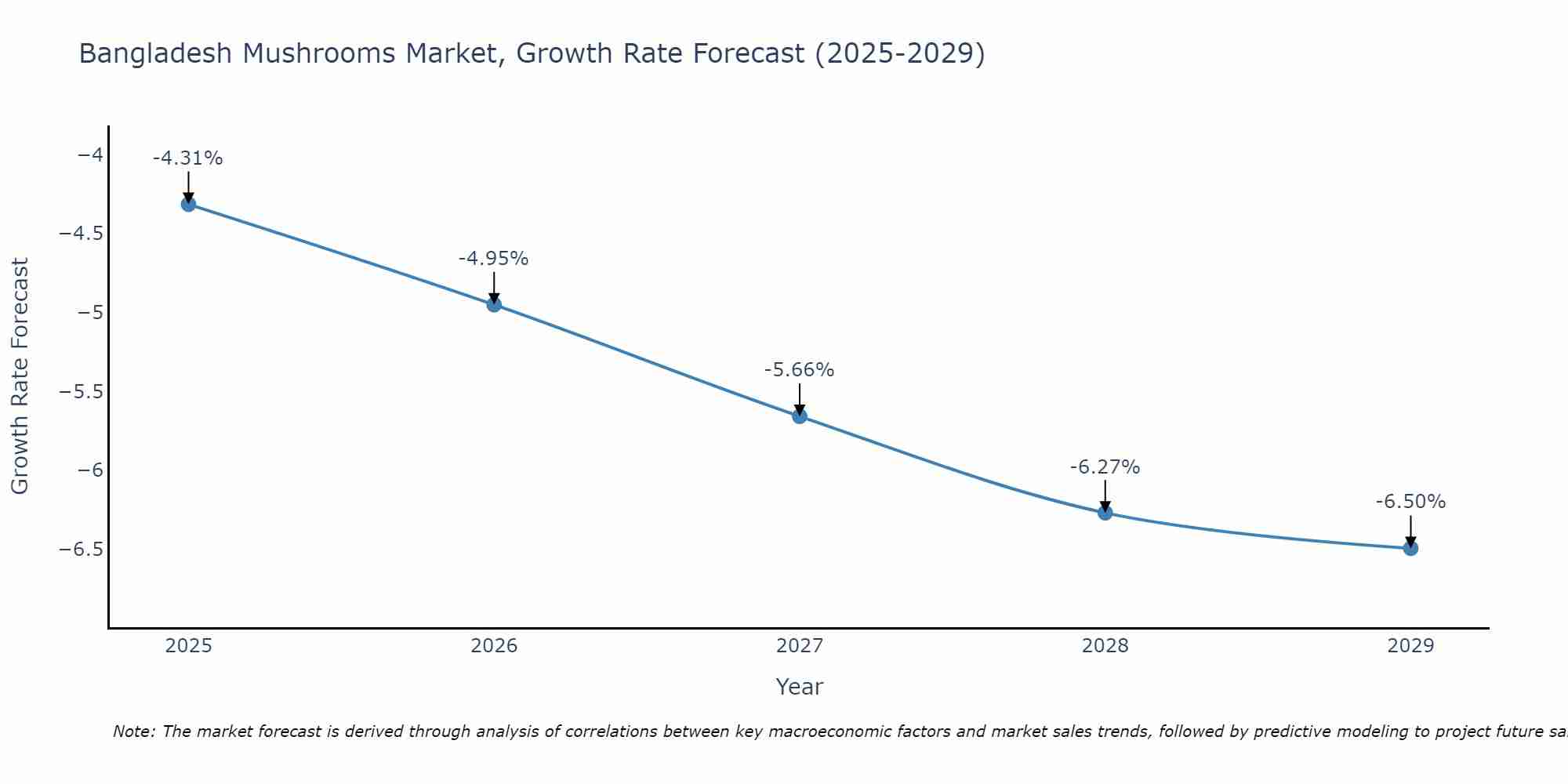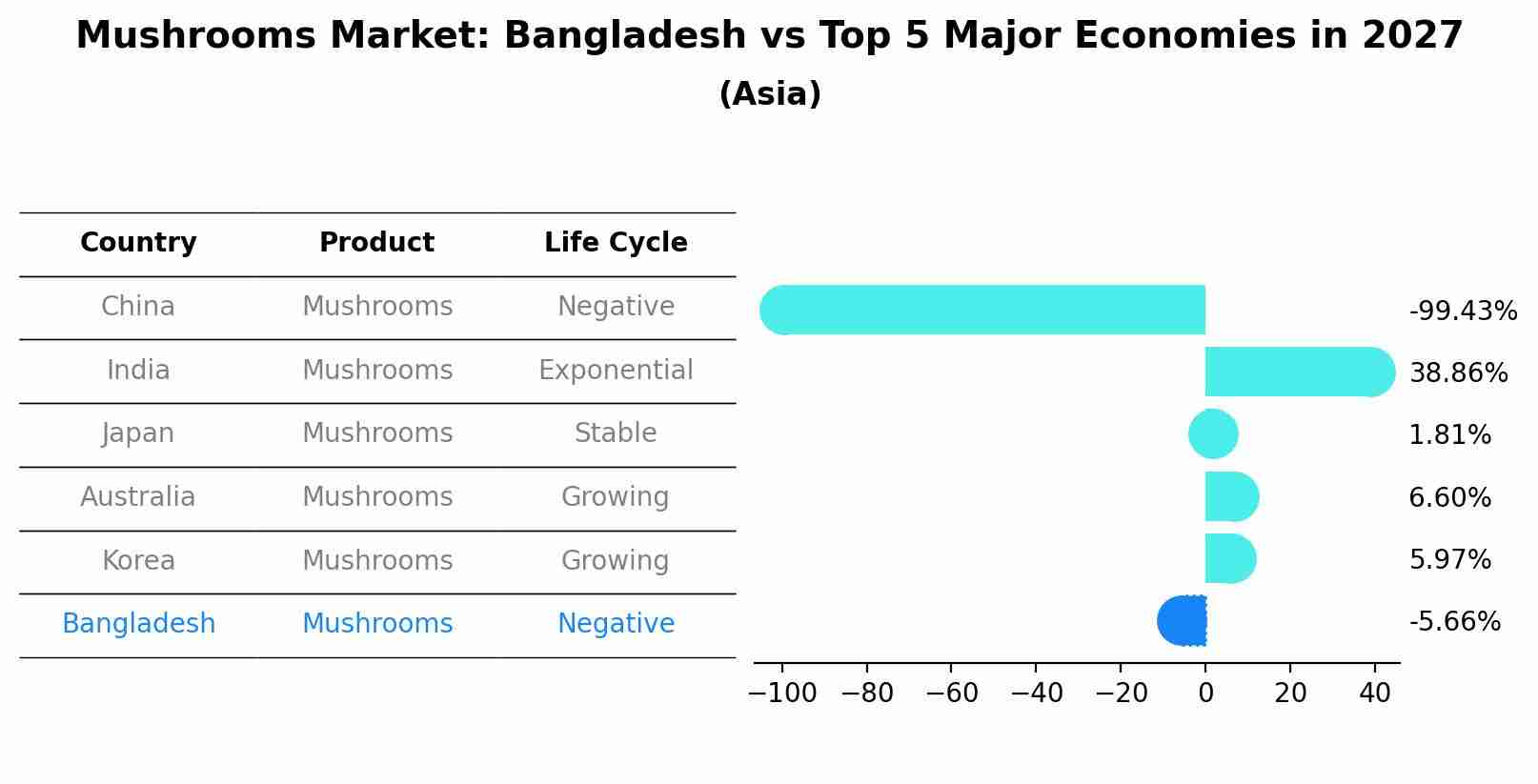Bangladesh Mushrooms Market (2025-2031) Outlook | Trends, Growth, Industry, Analysis, Companies, Share, Size, Value, Forecast & Revenue
| Product Code: ETC383192 | Publication Date: Aug 2022 | Updated Date: Jul 2025 | Product Type: Market Research Report | |
| Publisher: 6Wresearch | Author: Vasudha | No. of Pages: 75 | No. of Figures: 35 | No. of Tables: 20 |
Bangladesh Mushrooms Market Size Growth Rate
The Bangladesh Mushrooms Market could see a tapering of growth rates over 2025 to 2029. Starting high at -4.31% in 2025, the market steadily declines to -6.50% by 2029.

Mushrooms Market: Bangladesh vs Top 5 Major Economies in 2027 (Asia)
Bangladesh's Mushrooms market is anticipated to experience a negative growth rate of -5.66% by 2027, reflecting trends observed in the largest economy China, followed by India, Japan, Australia and South Korea.

Bangladesh Mushrooms Market Synopsis
The Bangladesh mushrooms market is experiencing steady growth due to increasing awareness of the health benefits and nutritional value of mushrooms among consumers. Oyster mushrooms, button mushrooms, and shiitake mushrooms are the most commonly cultivated varieties in the country. The market is driven by factors such as rising disposable incomes, changing dietary preferences, and a growing trend towards plant-based diets. Additionally, the demand for mushrooms is also supported by the expanding hospitality industry and the rise of health-conscious consumers looking for natural and organic food options. Despite facing challenges such as limited awareness in rural areas and fluctuations in supply due to seasonal variations, the Bangladesh mushrooms market is projected to continue its growth trajectory in the coming years.
Bangladesh Mushrooms Market Trends
The Bangladesh mushrooms market is currently witnessing a growing demand for exotic and specialty mushroom varieties such as oyster, shiitake, and reishi, driven by increasing consumer awareness about their health benefits and culinary versatility. There is also a rising trend towards organic and locally sourced mushrooms due to growing concerns about food safety and sustainability. The market is seeing a shift towards innovative mushroom-based products like powders, extracts, and supplements, catering to health-conscious consumers seeking functional foods. Additionally, the adoption of modern cultivation techniques and technology is on the rise among mushroom farmers in Bangladesh, leading to improved quality and increased production capacity. Overall, the Bangladesh mushrooms market is poised for steady growth and diversification in the coming years.
Bangladesh Mushrooms Market Challenges
In the Bangladesh mushrooms market, several challenges are faced that hinder growth and development. These challenges include limited consumer awareness and acceptance of mushrooms as a food source, lack of proper infrastructure for cultivation and distribution, inconsistent quality standards, and competition from other popular food items. Additionally, the seasonality of mushroom production and susceptibility to diseases further impact the market. Limited government support and research initiatives also contribute to the challenges faced by the Bangladesh mushrooms market. Overcoming these obstacles would require increased education and marketing efforts to promote mushroom consumption, investment in modern cultivation techniques and facilities, establishment of quality control measures, and collaboration between stakeholders to address issues related to production, distribution, and market access.
Bangladesh Mushrooms Market Investment Opportunities
The Bangladesh mushrooms market presents various investment opportunities due to the increasing demand for mushrooms as a healthy and nutritious food option. Investing in mushroom cultivation facilities, technology, and research can be lucrative in this growing market. Additionally, there is potential for value-added products such as mushroom extracts, powders, and supplements, catering to the health-conscious consumer base. Collaborating with local farmers to promote sustainable and organic mushroom farming practices can also be a promising investment avenue. As the awareness of the health benefits of mushrooms continues to rise in Bangladesh, strategic investments in the mushrooms market can offer long-term growth potential and profitability.
Jordan Agar Market Government Policies
The government of Bangladesh has implemented various policies to support the growth of the mushrooms market in the country. These policies include providing financial support and subsidies to mushroom farmers, promoting research and development in the mushroom industry, and offering training programs to enhance the skills of mushroom cultivators. Furthermore, the government has introduced initiatives to improve infrastructure for mushroom cultivation, such as establishing mushroom processing facilities and providing access to quality inputs. Additionally, there are regulations in place to ensure the quality and safety of mushrooms produced in Bangladesh, as well as to promote sustainable practices in the industry. Overall, these government policies aim to boost the production, quality, and competitiveness of the mushrooms market in Bangladesh.
Bangladesh Mushrooms Market Future Outlook
The Bangladesh mushrooms market is poised for significant growth in the coming years due to increasing consumer awareness of the health benefits associated with mushrooms. Factors such as rising disposable incomes, changing dietary preferences towards healthier options, and a growing trend towards plant-based diets are driving the demand for mushrooms in the country. Additionally, the expanding urban population and the rise of modern retail channels are expected to further boost market growth. With a focus on sustainable farming practices and technological advancements in cultivation methods, the Bangladesh mushrooms market is likely to witness increased production and variety offerings, catering to a diverse consumer base. Overall, the future outlook for the Bangladesh mushrooms market appears promising, with ample opportunities for expansion and innovation.
Key Highlights of the Report:
- Bangladesh Mushrooms Market Outlook
- Market Size of Bangladesh Mushrooms Market, 2024
- Forecast of Bangladesh Mushrooms Market, 2031
- Historical Data and Forecast of Bangladesh Mushrooms Revenues & Volume for the Period 2021 - 2031
- Bangladesh Mushrooms Market Trend Evolution
- Bangladesh Mushrooms Market Drivers and Challenges
- Bangladesh Mushrooms Price Trends
- Bangladesh Mushrooms Porter's Five Forces
- Bangladesh Mushrooms Industry Life Cycle
- Historical Data and Forecast of Bangladesh Mushrooms Market Revenues & Volume By Product for the Period 2021 - 2031
- Historical Data and Forecast of Bangladesh Mushrooms Market Revenues & Volume By Button for the Period 2021 - 2031
- Historical Data and Forecast of Bangladesh Mushrooms Market Revenues & Volume By Shiitake for the Period 2021 - 2031
- Historical Data and Forecast of Bangladesh Mushrooms Market Revenues & Volume By Oyster for the Period 2021 - 2031
- Historical Data and Forecast of Bangladesh Mushrooms Market Revenues & Volume By Matsutake for the Period 2021 - 2031
- Historical Data and Forecast of Bangladesh Mushrooms Market Revenues & Volume By Truffles for the Period 2021 - 2031
- Historical Data and Forecast of Bangladesh Mushrooms Market Revenues & Volume By Other for the Period 2021 - 2031
- Historical Data and Forecast of Bangladesh Mushrooms Market Revenues & Volume By Form for the Period 2021 - 2031
- Historical Data and Forecast of Bangladesh Mushrooms Market Revenues & Volume By Fresh for the Period 2021 - 2031
- Historical Data and Forecast of Bangladesh Mushrooms Market Revenues & Volume By Processed for the Period 2021 - 2031
- Historical Data and Forecast of Bangladesh Mushrooms Market Revenues & Volume By Distribution Channel for the Period 2021 - 2031
- Historical Data and Forecast of Bangladesh Mushrooms Market Revenues & Volume By Direct to Customer for the Period 2021 - 2031
- Historical Data and Forecast of Bangladesh Mushrooms Market Revenues & Volume By Grocery Stores for the Period 2021 - 2031
- Historical Data and Forecast of Bangladesh Mushrooms Market Revenues & Volume By Supermarkets & Hypermarkets for the Period 2021 - 2031
- Historical Data and Forecast of Bangladesh Mushrooms Market Revenues & Volume By Convenience Stores for the Period 2021 - 2031
- Historical Data and Forecast of Bangladesh Mushrooms Market Revenues & Volume By Online Stores for the Period 2021 - 2031
- Historical Data and Forecast of Bangladesh Mushrooms Market Revenues & Volume By Application for the Period 2021 - 2031
- Historical Data and Forecast of Bangladesh Mushrooms Market Revenues & Volume By Food for the Period 2021 - 2031
- Historical Data and Forecast of Bangladesh Mushrooms Market Revenues & Volume By Pharmaceutical for the Period 2021 - 2031
- Historical Data and Forecast of Bangladesh Mushrooms Market Revenues & Volume By Cosmetics for the Period 2021 - 2031
- Bangladesh Mushrooms Import Export Trade Statistics
- Market Opportunity Assessment By Product
- Market Opportunity Assessment By Form
- Market Opportunity Assessment By Distribution Channel
- Market Opportunity Assessment By Application
- Bangladesh Mushrooms Top Companies Market Share
- Bangladesh Mushrooms Competitive Benchmarking By Technical and Operational Parameters
- Bangladesh Mushrooms Company Profiles
- Bangladesh Mushrooms Key Strategic Recommendations
Frequently Asked Questions About the Market Study (FAQs):
- Single User License$ 1,995
- Department License$ 2,400
- Site License$ 3,120
- Global License$ 3,795
Search
Thought Leadership and Analyst Meet
Our Clients
Related Reports
- Afghanistan Rocking Chairs And Adirondack Chairs Market (2026-2032) | Size & Revenue, Competitive Landscape, Share, Segmentation, Industry, Value, Outlook, Analysis, Trends, Growth, Forecast, Companies
- Afghanistan Apparel Market (2026-2032) | Growth, Outlook, Industry, Segmentation, Forecast, Size, Companies, Trends, Value, Share, Analysis & Revenue
- Canada Oil and Gas Market (2026-2032) | Share, Segmentation, Value, Industry, Trends, Forecast, Analysis, Size & Revenue, Growth, Competitive Landscape, Outlook, Companies
- Germany Breakfast Food Market (2026-2032) | Industry, Share, Growth, Size, Companies, Value, Analysis, Revenue, Trends, Forecast & Outlook
- Australia Briquette Market (2025-2031) | Growth, Size, Revenue, Forecast, Analysis, Trends, Value, Share, Industry & Companies
- Vietnam System Integrator Market (2025-2031) | Size, Companies, Analysis, Industry, Value, Forecast, Growth, Trends, Revenue & Share
- ASEAN and Thailand Brain Health Supplements Market (2025-2031) | Strategy, Consumer Insights, Analysis, Investment Trends, Opportunities, Growth, Size, Share, Industry, Revenue, Segments, Value, Segmentation, Supply, Forecast, Restraints, Outlook, Competition, Drivers, Trends, Demand, Pricing Analysis, Competitive, Strategic Insights, Companies, Challenges
- ASEAN Bearings Market (2025-2031) | Strategy, Consumer Insights, Analysis, Investment Trends, Opportunities, Growth, Size, Share, Industry, Revenue, Segments, Value, Segmentation, Supply, Forecast, Restraints, Outlook, Competition, Drivers, Trends, Demand, Pricing Analysis, Competitive, Strategic Insights, Companies, Challenges
- Europe Flooring Market (2025-2031) | Outlook, Share, Industry, Trends, Forecast, Companies, Revenue, Size, Analysis, Growth & Value
- Saudi Arabia Manlift Market (2025-2031) | Outlook, Size, Growth, Trends, Companies, Industry, Revenue, Value, Share, Forecast & Analysis
Industry Events and Analyst Meet
Whitepaper
- Middle East & Africa Commercial Security Market Click here to view more.
- Middle East & Africa Fire Safety Systems & Equipment Market Click here to view more.
- GCC Drone Market Click here to view more.
- Middle East Lighting Fixture Market Click here to view more.
- GCC Physical & Perimeter Security Market Click here to view more.
6WResearch In News
- Doha a strategic location for EV manufacturing hub: IPA Qatar
- Demand for luxury TVs surging in the GCC, says Samsung
- Empowering Growth: The Thriving Journey of Bangladesh’s Cable Industry
- Demand for luxury TVs surging in the GCC, says Samsung
- Video call with a traditional healer? Once unthinkable, it’s now common in South Africa
- Intelligent Buildings To Smooth GCC’s Path To Net Zero


















